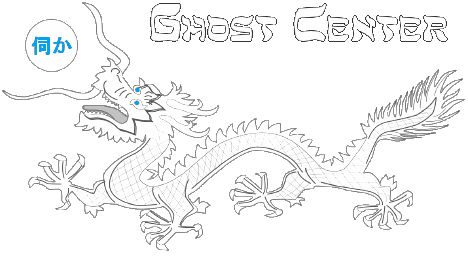
- International Version -
Back to main site
2018/04/20
- International Version - |
Back to main site |
 |  |
 |  |
||||
| No google translation - my own words:
There are a lot of people who speak japanese language additionally besides their native language. So, how come there are nearly no translations of ghosts? A lot of reasons. Reasons? For which problems? There are hundreds or thousands of 'fansubs' of anime and 'scanlations' of manga! Well, for example in anime there have been spoken words to be translated. You don't need to know any kanji, so easy! If you can speak japanese. Comes to reading and writing. Means signs in anime but now goes more to manga. If someone knows kanji its easy too, because of printed on paper. No problem to read that. So, what's with ghosts? Let's take a look at the scripts. A japanese person will see this - an english, french, german,... person will see that. The difference is because of ANSI(de) or better named ASCII (english/français/deutsch/日本語/and others). Nearly all japanese ghost's scripts are saved this way - except SSP's default ghost Emily and very few others, where scripts are saved in UTF-8 (english/français/deutsch/日本語/and others). |
Google翻译:
除了母语之外,还有很多人说日语。 那么,怎么几乎没有鬼的翻译? 很多原因。 原因是什么? 对于哪些问题? 有数百或数千个漫画动漫和“扫描”的'fansubs'! 那么,例如在动画中,有人说过需要翻译的词语。 你不需要知道任何汉字,太简单了! 如果你能说日语。 来阅读和写作。 意味着动漫的迹象,但现在更多的漫画。 如果有人知道汉字也很容易,因为印在纸上。 没有问题要阅读。 那么,鬼有什么? 我们来看看脚本。 日本人会看到这个 - 英语,法语,德语......人会看到这一点。 不同之处在于ANSI(de)或更好的命名ASCII(english /français/ deutsch /日本语/等)。 几乎所有的日本鬼魂脚本都以这种方式保存 - 除了SSP的默认幽灵Emily和其他几个, 其中脚本以UTF-8(英文/法文/德文/日本语/等)保存。 |
||||||
|
Well, I know, most chinese ghosts are encoded in UTF-8. However may be other problems... |
那么,我知道,大多数中国鬼都是用UTF-8编码的。 但可能是其他问题... |
||||||
|
Some problems while translating, for example: 1.) german word 'Himmel' to english: * sky [blue sky, cloudy sky, night sky] * heaven [place beyond our world where the angels live] As you can see, german language has only one word for both meanings 2.) english word 'wood' to german: * Wald [a lot of trees standing near each other] * Holz [piece of wood, made of wood - the material] As you can see, english language has only one word for both meanings 3.) In random talk of my 'Flamefox' ghost I'm refering about elves/elfs. You know what I mean. The german word for english word 'elv' is Elf. In german language Elf means an imaginary being of human form - like in english language. However in german language elf means 11 too (eleven in english language, but this does not fit elv at all) A german poet, Christian Morgenstern (english/français/deutsch/日本語/and others), has had the idea, if there are 11s - there must be 12s too... He wrote some weird poems I like, so I continued it a little bit. (btw, 伺か=weird - isn't it?) A word play, like often used for japanese ghost's names using kanji double use I think. Hard to translate, maybe untranslateable... ...so also: dialects, youth's speech, nerd's slang... I wonder if google can do this. I think google can't do it this decade, can't do next decade... |
翻译时出现一些问题,例如: 1.) 德语单词'Himmel'改为英语: * 天空[蓝天,多云的天空,夜空] * 天堂[超越我们的世界,天使居住的地方] 正如你所看到的,德语只有一个意思 2.) 英语单词'wood'to german: * 沃尔德[很多树站在一起] * 霍尔茨[一块木头,由木头制成 - 材料] 正如你所看到的,英语只有一个词的意思 3.) 在随意谈论我的'Flamefox'幽灵时,我指的是精灵/精灵。 你知道我的意思。 英文单词'elv'的德语单词是Elf。 在德语中,精灵意味着人类形式的虚构 - 就像英语一样。 然而,在德语语言中,精灵也意味着11个(英语十一个,但这根本不适合elv) 德国诗人Christian Morgenstern(英文/法文/德文/日本语/等), 有想法,如果有11个 - 也必须有12个... 他写了一些我喜欢的奇怪的诗,所以我继续了一下。 (btw,伺か=怪异 - 不是吗?) 一种文字游戏,就像我经常使用日文鬼的名字使用汉字的双重用法。 很难翻译,可能无法翻译... ...也是如此: 方言,青年的演讲,书呆子的俚语...... 我想知道谷歌能否做到这一点。 我认为谷歌这十年无法做到,下一个十年无法做到... |
||||||
 |  |
 |  |
||||
|
To be continued... |
|||||||
 |  |
 |  |
|